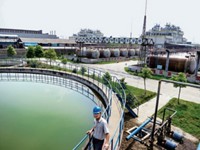Advertisement
Grab your lab coat. Let's get started
Welcome!
Welcome!
Create an account below to get 6 C&EN articles per month, receive newsletters and more - all free.
It seems this is your first time logging in online. Please enter the following information to continue.
As an ACS member you automatically get access to this site. All we need is few more details to create your reading experience.
Not you? Sign in with a different account.
Not you? Sign in with a different account.
ERROR 1
ERROR 1
ERROR 2
ERROR 2
ERROR 2
ERROR 2
ERROR 2
Password and Confirm password must match.
If you have an ACS member number, please enter it here so we can link this account to your membership. (optional)
ERROR 2
ACS values your privacy. By submitting your information, you are gaining access to C&EN and subscribing to our weekly newsletter. We use the information you provide to make your reading experience better, and we will never sell your data to third party members.
Business
The Road Less Traveled
Young Ph.D. chemist agrees to work for obscure Chinese producer of silane coupling agents
by Jean-François Tremblay
April 5, 2004
| A version of this story appeared in
Volume 82, Issue 14

INTERNATIONAL

When visiting a modest, township-owned specialty chemicals maker in central China, one does not expect to bump into a young, bright, English-speaking chief executive officer. Yin Chao, a Ph.D. chemist who was partly educated in Singapore, opted for the road less traveled when he agreed to manage a small co-op aspiring to break into the world market for silane coupling agents.
Jingzhou Jianghan Fine Chemical, the company Yin manages, is owned in majority by the township of Chenghe, which has a population of 60,000. Chenghe is in the borough of Shashi, in the Hubei province city of Jingzhou. Shabby and dusty, Shashi was once a busy industrial town, but it has fallen on hard times. The company is located in a depressed neighborhood that is part rural, part industrial, and part residential. From the factory gate, the facilities appear so old that one wonders whether the company is still in business.
Yin himself focuses more on what he wants to turn Jianghan into than what it looks like now. He expects that Jianghan will become a well-established producer of silane coupling agents, materials used in a variety of applications, a primary one being the production of silica-reinforced tread in tire manufacturing.
Gan Shuguan, Jianghan's chairman, awarded Yin a sweet deal when he hired him a year ago. Should Jianghan's performance improve markedly over the next few years, Yin will receive a 15% stake in the firm. Gan now owns 13% of Jianghan. A few months before wooing Yin, Gan hired a marketing manager, the jovial Wuhan native Norman Ho, who studied business administration and once lived in Vancouver.
Yin does not like Shashi much. "But I love this company," he says. As he inspects the production facilities, Yin is like a boy showing a new toy to his friends. "I can do so much here," he says. He points at a warehouse that is nearing completion. Inside one building, workers are installing new production vessels. Yin insists that safety is paramount. "The game is over if we have an accident," he says. Volatile materials such as methanol, ethanol, and styrene are used in making silane coupling agents.
For now, Yin has a simple plan for the company. "We need to improve product quality and range," he says, adding that Jianghan covers only about one-quarter of the full range of silane coupling agents available in the global marketplace. The development of silane coupling agents does not require sophisticated research facilities. But it is a time-consuming process that demands a good understanding of how the products are used by customers. Yin readily admits that Jianghan's application knowledge is still too weak.
Another challenge facing Jianghan is its difficulty in obtaining capital. Because the company lacks the political connections to obtain bank loans, its cash flow depends entirely on its profitability. For the time being, the company can only allocate Yin and five researchers to its product development efforts. Ho insists that Jianghan's lack of official support is a plus, making the company market-driven and eager to succeed.
BUT YIN IS CONFIDENT that even though the quality of Chinese-made silane coupling agents does not match what is available on the international market, Jianghan can catch up. Imported silane coupling agents are too expensive, he says, thus encouraging customers to make do with what's available from local firms. Furthermore, global market leader Degussa has not yet set up a facility in China, something that would make it more difficult for Jianghan to compete locally. Degussa has long studied the Chinese market but has yet to commit to a silane coupling agents plant in China.
Many non-Chinese customers already find that Jianghan's quality is fine for them, too. In fact, most of Jianghan's customers are abroad, although most of the company's sales volume is in China. The foreign customers are from South Korea and Taiwan, and a few inquiries are coming in from England. Yin says that despite China's fast economic growth, the international market is more appealing because margins are higher and it demands a wider and more sophisticated range of silane coupling agents.
Jianghan started out in 1974 as a construction and general engineering company. As business stagnated in the 1980s, the firm experimented with making a variety of products ranging from surgical gloves to vibrating beds for infants. It eventually began to focus on silane coupling agents about five years ago.
As part of his doctoral studies, Yin spent two years with Johns Hopkins Singapore at the National University of Singapore. Instead of living in an ugly city in central China, he could now be a researcher at a large university or working for a multinational company. Singapore, he says, is clean and developed, and its people are polite. "But this here, this is exciting," he says.





Join the conversation
Contact the reporter
Submit a Letter to the Editor for publication
Engage with us on Twitter